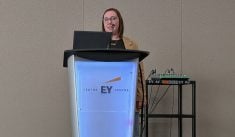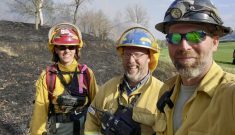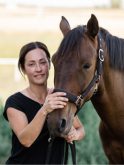I’ve heard many speakers on farm succession. Most of them have good messages; some of them are exceptionally good at creating enthusiasm, and some have useful stories that make you squirm because you can see yourself in them.
None have them have quite put things like Tom Deans, the keynote speaker on Day 1 of the Southwest Ag Conference (SWAC).
Deans is not from agriculture, but he comes from a family of entrepreneurs. Generations of his family have created and sold businesses, only to have the next generation start something completely new with help from the proceeds of the previous generation’s fortunes — and their own hard work and ingenuity.
Read Also

Ontario’s agri-food sector sets sights on future with Agri-Food 2050 initiative
The first-ever Agri Food 2050, a one-day industry event dedicated to envisioning the future of food and farming in Ontario,…
Sometimes it makes sense to move out of one family history and into something completely new — or something not quite, but slightly new.
His family’s succession discussions all involved asking the younger generation if they were willing to risk their own capital to buy the family business. They had to have skin in the game. And if they weren’t willing to go that far, then it likely made little sense to pass along the business.
His own story is a good example. He started buying shares of his family plastics business in Orangeville while he was working in banking. Then his father put him on the board of directors. Then, after years of working elsewhere, he started working in the business. But, after concentrating suppliers, an expensive dispute with a neighbour and an industrial accident he said “no” when his father asked if he wanted to buy controlling interest in the business. He feared his father’s reaction, but his parent high-fived him and told him it was the right decision.
Within six months some serious market changes made the plastics business much tougher and the decision proved an excellent one.
There are several lessons in Deans’ story for farmers. There can be a presumption of inheritance by the younger generation, or an assumption by the older generation that their children will continue with the family business. Neither should be assumed. There needs to be an open family conversation about finances and plans. That’s not new in what other farm succession speakers say,but the difference highlighted by Deans is that the younger generation’s willingness to invest is a critical component of the discussion. They have to risk some of their capital to make it happen. That direction assumes that the younger generation has access to capital. The main point here is that they don’t have to have access to all the capital to buy the farm operation, but they have to have been out, off the farm, and ambitious or entrepreneurial enough to have earned enough cash that they can put some of it into the farm. It’s about having a willing buyer and a willing seller.
The other potentially uncomfortable part of Deans’ message is his focus on succession of family wealth, not the family business. Many farm families are tied to the operation they have now, and the multigenerational home farm. No one wants to farm? He’s says cash it in and help the entrepreneurs of the next generation achieve their dreams.
That logic can also apply to farming, but with a looser definition applied to farm succession.
I have seen this happen. A dairy farmer’s children want to farm poultry, so the dairy farm is sold and poultry farms are bought. Maybe an original farm is sold and the family moves into agriculture service or retail.
My biggest takeaway from Deans’ talk was the suggestion that succession is a broader conversation than the farm. A close second was his emphasis, like most other farm succession speakers, on starting the conversation. You never know what can happen until you start talking.
He talked about the family owners of a large company in Toronto. He had a call from the owner who invited him to meet. Deans, who isn’t a consultant, but a speaker and writer, was intrigued enough to visit them. An older gentleman came into the board room. At 70, he was the successor. His father was in his 90s. By the end of the discussion they realized that the successor was a willing buyer, on his father’s terms (such as being able to keep his office), and the father, at those terms, was a willing seller.
They just hadn’t been able to start the conversation. With billions in assets on farms to be transferred over the next couple of decades, those are conversations with great value.















